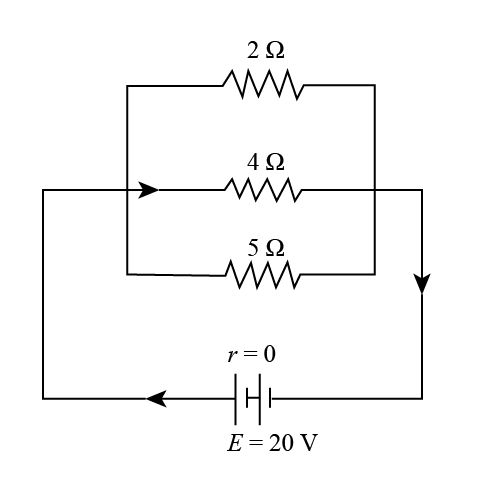Question
Question: Three resistors 2 Ω, 4 Ω and 5 Ω are combined in parallel. This combination is connected to a batter...
Three resistors 2 Ω, 4 Ω and 5 Ω are combined in parallel. This combination is connected to a battery of emf 20 V and negligible internal resistance. The total current drawn from the battery is?
Solution
Hint: When many resistors are connected in parallel, the voltage across each resistor is the same. But the current across every resistor is different when the circuit is connected to external emf. The maximum current opts for a path of least resistance.
Complete step by step answer:
Refer to the circuit given below.

Let the current through 2Ω,3Ω,5Ω resistors are I1,I2,I3 respectively.
Current I1 flowing through a resistor R1 is given by:
I1=R1E I1=2Ω20V I1=10A
Current I2 flowing through a resistor R2 is given by:
I2=R2E I2=4Ω20V I2=5A
Current I3 flowing through a resistor R3 is given by:
I3=R3E I3=5Ω20V I3=4A
Therefore, the total current drawn from the battery is given by:
It=I1+I2+I3 It=10A+5A+4A It=19A
Hence the total current flowing is 19 A.
Additional information: When a current is flowing in a circuit then there is a voltage drop in source voltage or battery and it is termed as internal resistance. The electrolytic material inside the battery is responsible for internal resistance.
Note: When the internal resistance is given, the current through a resistor is given by I=R+rE where r is the internal resistance offered by the battery itself. It can be seen that the current through a resistor is reduced when an internal resistance is there.
